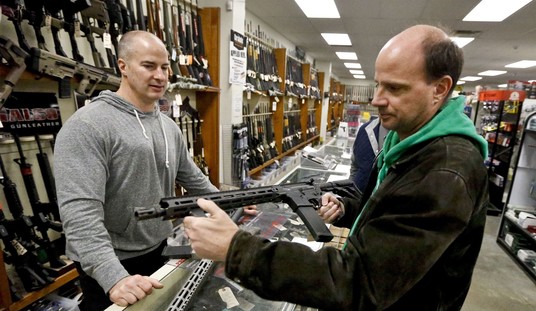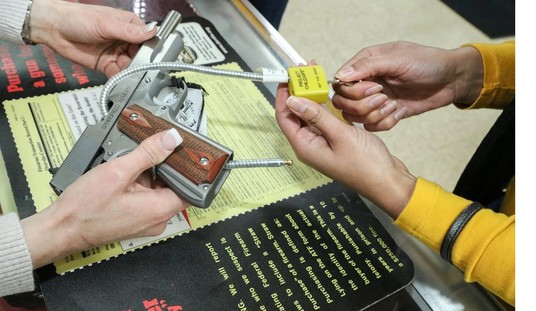The police officer who shot and killed an Alabama man who was responding to a shooting at a mall in 2018 has acknowledged he failed to activate his body camera or issue a verbal warning to the armed citizen before opening fire, but says that he “acted reasonably and consistently under fast moving circumstances” and should be immune from a civil lawsuit filed over the death.
The new details in the case emerged in a response to the civil lawsuit filed by the officer’s attorneys and offer some additional information about the chaotic scene at the Riverchase Galleria on November 22nd, 2018.
EJ Bradford was at the mall when gunshots rang out that afternoon. The 21-year old Bradford, according to attorneys representing his family, initially tried to flee from the gunshots, but turned back and ran towards the sound of the gunfire when he realized that someone had been hit and injured.
Bradford, who possessed an Alabama carry permit, drew his gun as he approached the wounded man, identified as 18-year old Brian Wilson, in order to protect Wilson and others from any further attack. Instead, Hoover police officer David Alexander and one other officer whose name has not been publicly released arrived at the scene of the shooting seconds later it took place. Alexander, spotting Bradford with a gun in his hand, fired four rounds from his service pistol, striking Bradford multiple times.
In his answer to the lawsuit on Aug. 13, Alexander agreed there was no body camera activation. But the attorneys point out he had only seconds to respond.
“Alexander admits that at the time of the Wilson shooting, he was wearing a body camera provided by the City of Hoover, and did not activate the camera in the three seconds after hearing gunshots and before shooting EJ Bradford.”He also said he fired the fatal shots.“Alexander admits that, upon observing EJ Bradford with a handgun moving toward Wilson and a second person who was leaning over Wilson, he fired four rounds from a Glock 19X 9mm pistol at EJ Bradford.”Also, despite witnesses who had initially said they heard warnings issued by officers, Alexander stated in his answer that he has no recollection of a verbal warning were made before the shooting.“Alexander admits that he has no recollection of issuing a verbal warning or command to EJ Bradford in the few seconds after shooting began and before EJ Bradford was shot,” Alexander’s attorneys wrote.But Alexander denied he violated any standard police procedure or training.Alexander’s attorneys emphasized the condensed time frame of events.“Alexander admits that, in the two seconds it took him to fire four bullets, all within less than three seconds after hearing shots fired in a crowded mall filled with innocent shoppers, EJ Bradford was moving towards two persons as if ready to fire.”Only one officer fired his weapon. “Alexander admits that the police officer with him did not fire his handgun,” the defendants said. “Alexander admits that the shooting of Wilson by Erron Brown occurred within three seconds before EJ Bradford was shot.”
Alexander’s shooting of Bradford was deemed to be justified by the Alabama Attorney General’s office in February of 2019, but Bradford’s mother, April Pipkins, filed a civil lawsuit shortly after the decision was released.
Here at Bearing Arms we’ve been talking quite a bit recently about the conflict between qualified immunity for police officers and our right as American citizens to keep and bear arms, and the Bradford case is another example of the legal system placing law enforcement over armed citizens. No one alleges that Bradford was the one responsible for shooting Brian Wilson. In fact, no one’s alleged that Wilson committed a crime at all. The position of the Alabama AG and the Hoover police appears to be that it was just bad luck that Bradford was mistaken for the shooter by Alexander.
The fact that Alexander acknowledges that he never issued a verbal command to Bradford to drop his weapon or gave him a warning before firing, however, is important. I can understand forgetting to turn on your body camera in the seconds between hearing gunshots and arriving at the scene of the shooting, but the fact that Alexander shot Bradford without first telling him to drop his weapon is troubling, to say the least.
Alexander’s attorneys argue that the officer’s actions were “reasonable, necessary and justified under the circumstances at that time,” but I disagree. Clearly the actions weren’t necessary, since an innocent man was killed while the actual suspect had already fled the scene and wouldn’t be arrested until almost a week had passed. Given the fact that Bradford had no warning before he was shot and killed, I also have to disagree with the assertion that Alexander’s actions were reasonable and justified.
We’ll see what the courts have to say. Alexander’s attorneys are trying to get the civil case dismissed on the grounds of qualified immunity, and a judge could issue a ruling soon that will determine if the litigation can proceed or if EJ Bradford’s death will go unchallenged in a court of law.









Join the conversation as a VIP Member